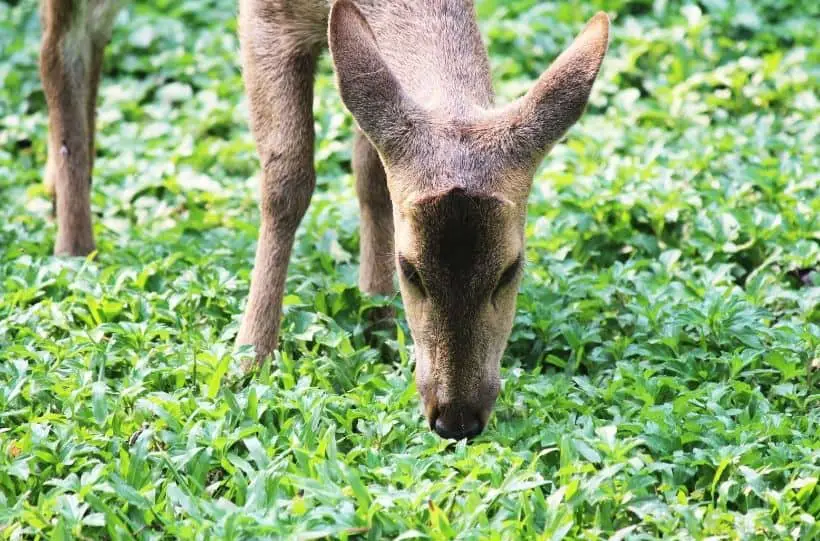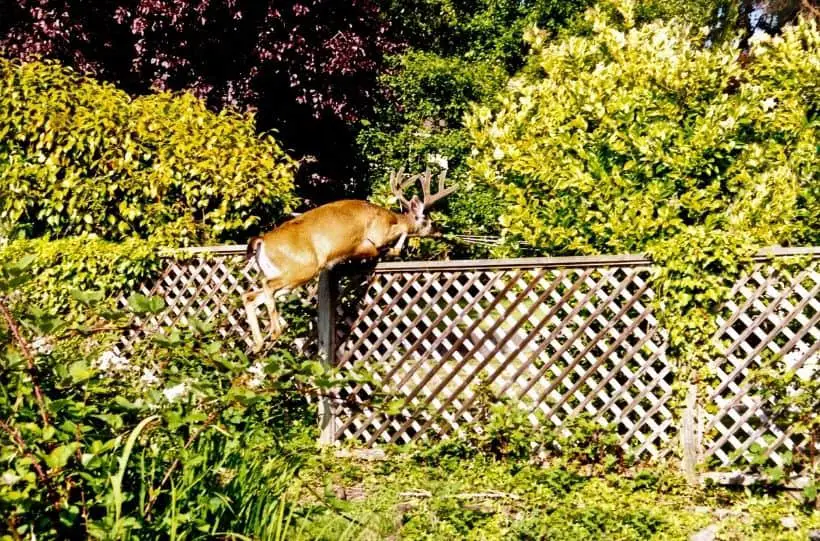How to Protect Your Garden From Deer
If you live in an area where deer are present the odds are you have lost a few prized plants to these herbivores. These gentle creatures can eat a lot of food and tend to destroy gardens when they find their way in.
With a few simple tricks and a bit of effort, you can help protect your garden and even help the local deer thrive without allowing them to eat the food your family needs, or destroy your landscaping and flower beds.

How deer can destroy your garden
Deer are one of the most destructive wild animals in the garden. These animals graze all day and tend to travel in groups allowing them to kill off more plants at once than other animals.
Deer often attack gardens in the early morning before humans and pets are out during the day and unlike rabbits and other common garden pests, deer are taller and can easily kill off larger plants.
How to Repel Deer
Your best defense for your garden is to repel deer before they get too close to your garden. This can be done by planting things that deer do not like around the perimeter of your yard.
There is a wide range of plants that range from edible to decorative that can be used for helping make your yard less appealing to deer including chives, marigolds, Russian sage, and daffodils.
Closer to your garden you can help to repel deer by growing your garden with plenty of strong-smelling herb combinations planted within like oregano, chives, and garlic. Deer prefer mild-smelling plants and will try to go around these and look for other plants.
Soap-like Irish spring has a very strong fragrance and is known for being a very successful deterrent for deer in the garden. You can hang your soup in mesh bags about waist height around your garden to help repel deer due to the strong smell.
The rain will wear the soap down so you may need to replace and replenish this from time to time.
Deer are not fans of spicy peppers. Growing spicy peppers in your garden or along the border of your garden is a great way to help keep deer away from your garden.
Because deer do not like the strength of peppers you can use a spray of cayenne pepper and water or cayenne pepper, garlic, and water in your garden to help make your garden less appealing to deer and keep them away.
Keeping a pet dog is a great way to make your yard less inviting to deer. Most deer will stay away from a yard that has a large dog running around it during the day when they are out. This works best if you have a fenced area and your garden is safe from your dog that may trample it.
Noisemakers can be a great deterrent for deer. Deer are naturally skittish animals that tend to run from nearly any noise. Try tying tin cans to string or adding wind chimes around your yard so when the wind blows, the sound will scare them off.
Ultrasonic repellers. While these devices are hit or miss many people have success with placing ultrasonic repellers around their gardens to help repel unwanted wildlife including deer from their gardens. These work by releasing a frequency that scares deer off in a similar way to noisemakers.
Human hair makes a great repellent for deer. When you cut your hair or clean out your hairbrush instead of throwing the hair away or tossing it into the compost pile, sprinkle the hair around your yard.
The smell will alert deer to the fact that humans are in the area and they will stay away in an effort to avoid you.
Install a motion sensor sprinkler system. Installing a sprinkler that will go off when a deer goes past it in the early morning, helps to water your garden and make it less appealing to deer that want to get to the plants you are growing.
This will eventually stop working as your local deer learn that the system is just water but it can be a great addition to other deterrents.
How to Keep Deer Out of Your Garden
One of the best protective measures for deer is a fence. While deer can easily jump a fence to your yard when given ample room, a tall fence around a smaller garden can be harder to get over and land safely inside of your garden.

Adding a fence that is at least 7 to 8 feet tall around smaller garden plots works well for keeping deer out.
If you are using tall raised garden beds you can design them in a U shape with a door and walk-in area. Place fencing along the top of the beds to keep deer from reaching in and make it impossible to have enough space to land.
You can buy garden beds designed this way for easy gardening even in an area that deals with deer.
Try placing food out for the deer. Growing a small garden away from your protected one can make your garden seem less appealing when the garden from them doesn’t take any work to get to.
You can also set up a feeding station with food scraps or deer feed to help feed the local deer away from your garden. This is a great way to be friendly to the wildlife while protecting your garden.
What to do if Deer Get Into Your Garden
If you caught the deer early enough you can likely save your plants after taking the time to remove damaged vegetation and giving your plants some fertilizer to help them recover.
If your plants are far too damaged you may want to pull them and replant something that has enough time to complete their growing cycle in the amount of time left in your gardening season.

